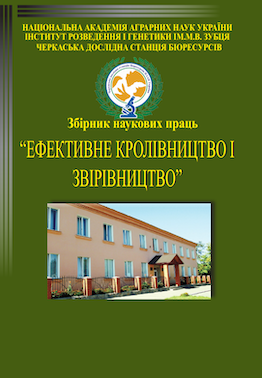PRODUCTIVITY OF REFRIGERATED YOUNG PEOPLE FOR BREEDING FULL-COMPOUND FEEDS WITH DIFFERENT LEVELS OF CALCIUM AND PHOSPHORUS
DOI:
https://doi.org/10.37617/2708-0617.2020.6.125-135Abstract
The influence of feeding of mixed feeds with different levels of Calcium and Phosphorus on the productive qualities and costs of feed in the rabbit repair young was studied. For the experiment according to its scheme at the age of 113 days 120 heads of rabbits were selected, from which on the principle of analogues 6 groups were formed, 20 heads in each (10 males and 10 females). During the equalization period, all test rabbits were fed full-feed compound feed of the same composition. The difference in the feeding of the animals in the control and experimental groups was due to different levels of calcium and phosphorus in the diet. The levels of calcium and phosphorus in the diets of the animals of the experimental groups were regulated by the addition of chalk and dicalcium phosphate, using mathematical methods for optimizing the recipes of compound feed Win Mix 2.0. If at 120 days of age the control and experimental groups were not significantly different in live weight, then (127, 134, 141, 148, 155 and 162 days) varied differently and depended on the calcium and phosphorus content of the diet. The highest live weight of young rabbits at 120-165 days of age is provided by compound feed containing 0.4% calcium and 0.4% Phosphorus. Changes in the live weight of experimental animals had a significant effect on the average daily increments. During the period of growing rabbits from 120 to 162 days of age on average daily weight gain of young animals of group 4, respectively, 21-38% outperformed (P <0.001) analogs of 1, 2, 3, 5 and 6 groups. Unequal changes in the live weight of young groups of individual groups were due to different growth rates, as evidenced by the relative increase in live weight of animals. During the period of growing rabbits from 120 to 162 days of age by relative weight gain of young animals of group 4, respectively, by 0.2-3.5% outperformed other experimental animals. It is established that the optimal parameters of providing them with Calcium and Phosphorus in the 120-165 days age range are 0.4% and 0.4%, respectively, in 100 g of complete feed.


